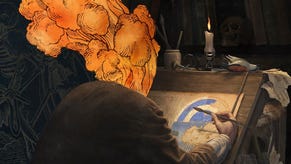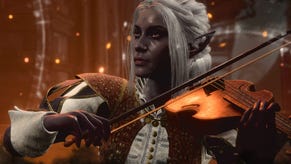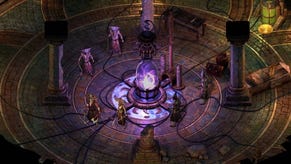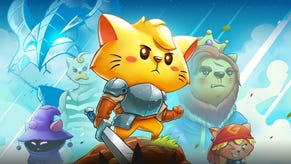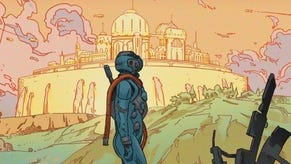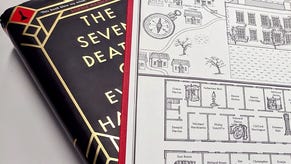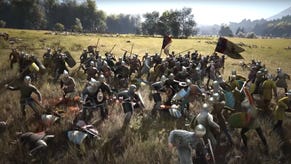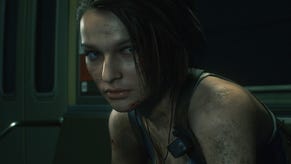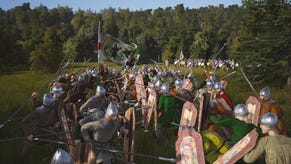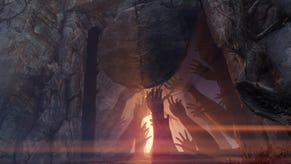Lots more Project Eternity information and a tentative spring 2014 release date
"Is the act of sacrificing someone for the greater good a good act in itself?"
Obsidian Entertainment was "floored" by the response to the Project Eternity Kickstarter funding drive, Tim Cain told me. The goal of $1.1 million was surpassed in one weekend, and the total now stands at over $1.55 million.
Tim Cain is the creator of Fallout, of Arcanum and of disappointing (but I still loved it) The Temple of Elemental Evil. He helped program Vampire: The Masquerade - Bloodlines. And he joined Obsidian Entertainment in October 2011.
"Work has already begun on [Project Eternity]," Cain explained, "but the advantage of doing the Kickstarter this early in its development is that we can be guided by the feedback from our fans. We are reading the forums and noting what features people think are most important in the game, and then we are revising our work schedule accordingly."
Project Eternity is pencilled for a spring 2014 release. Emphasis on the pencilled - there's still so much to decide and to do.
My main concern about Project Eternity is that fans expect too much. While $1.55 million - or $2 million, or $3 million - may seem like a big wad of cash, it's nowhere near the budget a team like Obsidian usually works with. Granted, Obsidian's going for a retro isometric, text-driven RPG with Project Eternity, but will that be enough to satisfy the hype? Should fans temper their expectations?
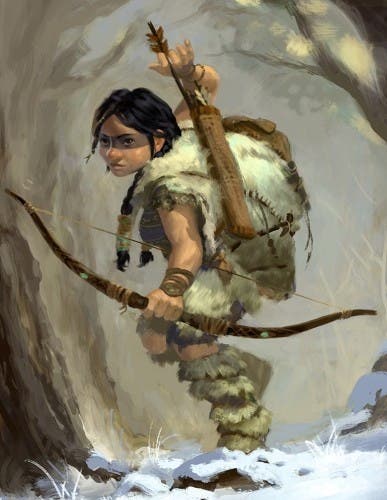
"Those budget numbers are just right for what we are trying to make," Cain answered. "We have an engine already, and we aren't using an established IP with pre-defined game mechanics and an art style that we have to mimic. Both of these things save us a lot of time, because we are now free to make those elements ourselves.
"Here's an analogy: if you ask me to make you a cake, I can bake one and have it ready for you in a couple of hours, and it'll be very tasty."
Great; can you make me a cake?
"Is killing always evil? Is the act of sacrificing someone for the greater good a good act in itself? Does doing good things make a person good?"
Tim Cain
"But if you come to me with a photo of a cake and ask me to replicate it, that'll take me a lot longer to do, even though the final result might not taste any different than the first cake. Does that make sense?"
How about that cake?
"Damn, now I want some cake."
My theory is Obsidian may opt for an episodic approach. Not literally, but to launch a realistically-sized adventure first, then to build the world out with subsequent instalments after that. The feast would be staggered over courses, rather than Obsidian faced with the daunting prospect of cooking and presenting it all at once.
The Project Eternity Kickstarter blurb mentioned taking your hero character through "future adventures", which seemed to back this theory up. "Yes," Cain answered, "we are hoping to make additional content for the game which you can explore with the same characters."
Josh Sawyer will be project leader on Project Eternity, Cain informed me. Sawyer was project director and lead designer of Fallout: New Vegas for Obsidian, and also worked at legendary RPG studio Black Isle.
Tim Cain will handle system mechanics and programming for Project Eternity. Chris Avellone is involved with all Obsidian projects as the studio's creative director. But Avellone, once lead designer of Planescape: Torment, will also "specifically be doing writing on this project", Cain shared.
Team size on Project Eternity depends on final budget and feature set. "I'm the most comfortable with teams between 20 and 30 people, so that everyone knows what everyone else is working on," Cain responded, "but if we need to pull in more people to make this game as big and as high-quality as we want, I am sure we will do that."
Gameplay length of Project Eternity, again, "completely depends" on funding. "Adding new content is one of the most time consuming aspects of the RPG development," Cain stressed. There are stretch goals on Kickstarter that will add new races, characters and even entirely new areas.
The nature of the game

Josh Sawyer set the Project Eternity premise in a Kickstarter update posted overnight.
"The player witnesses an extraordinary and horrific supernatural event that thrusts them into a unique and difficult circumstance. Burdened with the consequences of this event, the player has to investigate what has happened in order to free themselves from the restless forces that follow and haunt them wherever they go," he wrote.
"Your character is not required to be of any particular race, cultural background, sex, class, moral outlook, personality, organisation, etc. The premise is that you are a victim of circumstance. How you choose to deal with your situation is up to you. You can bear it with stoicism and restraint, or fly off in a rage at anyone who gets in your way. The world will react to your choices, but the game is designed to give you the freedom to play your character the way you want to."
Freedom's the operative word. BioWare's announcement of Dragon Age 3 met a mixed reaction because there are those disillusioned with the perceived corporate attitude of 'must make a profit, must entertain everyone'. Kickstarter bets are smaller, and devoted fans play the role of publisher. The general effect is one of creative liberation.
Take Cain's game The Temple of Elemental Evil: "Many of the quests and characters in the town of Nulb were removed at the publisher's request," Cain recalled, "and others were significantly changed, despite being based on the original D&D module. That kind of censorship won't happen here."
Cain is excited about developing mature themes for Project Eternity. "To me, a mature game deals with some issues of a serious nature," he elaborated. "Moral choices are a perfect topic. For example, is killing always evil? Is the act of sacrificing someone for the greater good a good act in itself? Does doing good things make a person good? Torment explored these ideas in exquisite detail, and we'd like to do the same."
"Simply put, people who have whole, unbroken souls are more powerful than those people who just have fragments of souls. The nature of these souls, and how they might break, is something we will explore in the game."
Tim Cain
Planescape: Torment, Baldur's Gate and Icewind Dale were all cited as touch-stones for the kind of game Project Eternity will be. The influence of those games will be felt in "a more general way", Cain told me. "We like the isometric view, the real-time-with-pause combat, and the general vibe of those games, but we are not planning to replicate any particular feature from them."
Also, Project Eternity will be a more traditional fantasy game, whereas Torment was almost surreal. Nevertheless, Eternity "will have its own special twists"; "It is definitely not going to be a standard, cookie-cutter fantasy realm," Cain stressed.
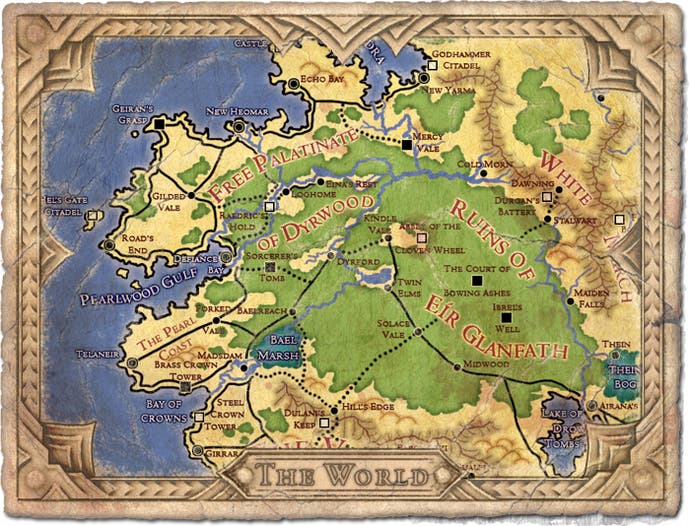
The mechanics of Eternity
Project Eternity won't be built on Dungeons & Dragons rules. "We are making our own RPG mechanics," Cain revealed, even though D&D has been "a huge influence" on them.
At the core of the rules will be souls. In the Kickstarter video, Josh Sawyer said a character's soul was tied to the magic system. Cain expanded: "No, you don't have to be evil to access any abilities. They aren't categorised like that. Instead, in this world, your soul is connected to your power. Simply put, people who have whole, unbroken souls are more powerful than those people who just have fragments of souls. The nature of these souls, and how they might break, is something we will explore in the game.
"While there are social concepts of good and evil," he added, "the game does not track an alignment for the player. Instead we will use a reputation system to keep track of what different groups in the world think of you. Consequences of your actions will matter in Project Eternity."
Combat in Project Eternity will be real-time with a pause element, with an emphasis on tactical group warfare, not click-and-slash butchery.
"I like turn-based combat too," Cain remarked, when I told him I'd rather have that. "I like the tactics involved in the precise movement, orientation and use of abilities. But it can tend to be slow with a large party of character. Real-time-with-pause is faster and can feel more engaging, but I have found the abilities to be harder to use well. One reason for that is because many RTWP RPGs were made based on paper-and-pencil games that used turns, and their abilities were made for opponents that were not moving. I feel that RTWP can be an excellent combat model if the abilities are designed with respect to that model, and not converted from another system."
"We are creating a range that encompasses the recognisable (e.g. humans, elves, dwarves), the out-of-the-ordinary (e.g. the so-called 'godlike') and the truly odd (?!)."
Josh Sawyer, project lead, Project Eternity
Project Eternity will feature "a large number" of set group formations that you can use, Josh Sawyer revealed. And formations can be rotated to ensure you're always protecting your party's softer bits - i.e. magic wearers not clad in armour. Group abilities aren't designed yet, Cain told me, who like the idea but said nothing more.
Groups or parties in Project Eternity can contain six characters: your hero plus up to five companions. "Companions are never forced on the player," Sawyer stressed. You can trundle through the game alone.
"In Project Eternity, companions exist for both narrative and mechanical purposes," Sawyer explained. "Companions are designed to have a driving interest in the player's central conflict. Their personalities and motivations open plot branches and generate conflicts for players to resolve over the course of the story. They are highly reactive to the player's actions and to the world around them.
"Additionally, companions exist to give players strategic management options in party composition that expand the party's capabilities in exploration, combat, and quest resolution."
The races and classes of Project Eternity are still in flux, because more will be developed if stretch goals are reached. "We are creating a range that encompasses the recognisable (e.g. humans, elves, dwarves), the out-of-the-ordinary (e.g. the so-called 'godlike') and the truly odd (?!)," Josh Sawyer detailed. "Races and sub-races differ from each other culturally, but the races also have different physiological factors that can contribute to friction and confusion between them."
Cain told me Obsidian plans to have unique traits for races "so that playing an elf doesn't feel like playing a human, even if they are both the same class".
Sawyer continued: "Within even the recognisable races (including humans), we are creating a variety of ethnic subtypes and nationalities. This world's races did not all spring forth from the same place, and millennia of independent development have resulted in distinctive and unconnected groups. For example, the dwarf ranger [concept art - posted in this article] is originally from a southern boreal region that is quite different from the temperate homes of her distant kin to the north.
"Additionally, Project Eternity's world contains some isolated races and ethnicities, but transoceanic exploration and cultural cohabitation have heavily mixed many racial and ethnic groups over time. This mixing is not always... peaceful. At times it has degenerated into genocide and long-standing prejudices are ingrained in many cultures."
Given the game's fantasy bent, I expect the usual stereotypes of fighter, thief and mage, and variations on that theme.
"At a minimum, players will be able to specify their main character's name, sex, class, race (including sub-race), culture, traits, ability scores, portrait and the fundamental starting options of his or her class (gear, skills, and talents)," outlined Sawyer.
"We have not worked out customisation details of character avatars, but we believe those are important and will be updating on these specifics in the future."
Multiplayer isn't ruled out. "Interest?" Tim Cain mulled. "Yes, but not if it risks reducing the scope or quality of the single-player game in any way. Single-player gaming is our focus."
Oh, and Project Eternity "will have guns", Cain told me, "but we are not going into their details right now".


